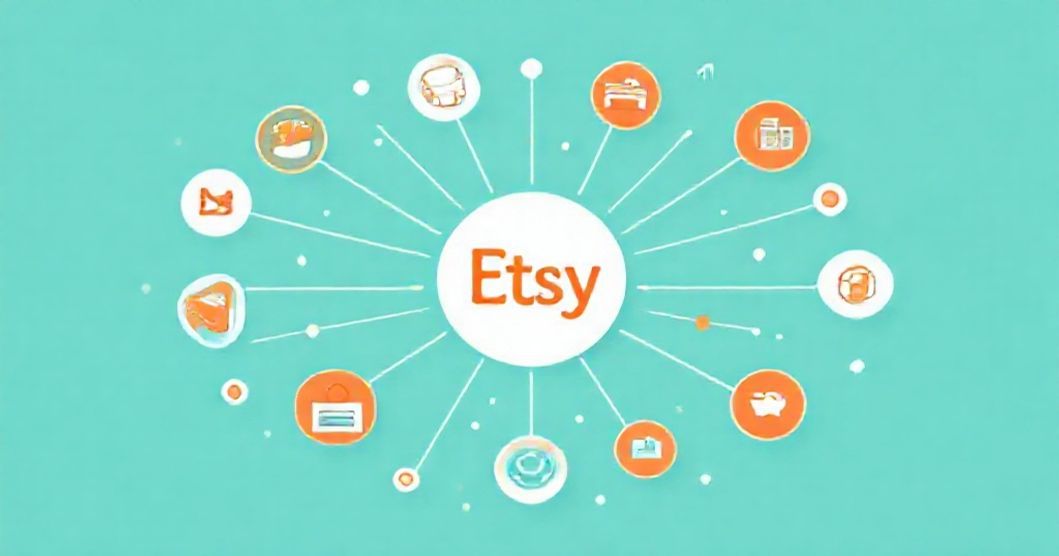In the dynamic world of online retail, effectively managing an Etsy shop requires more than just creating unique products. Strategic Etsy integrations play a pivotal role in streamlining operations, expanding reach, and significantly boosting overall efficiency for sellers. These powerful connections between your Etsy store and various external software platforms can automate tedious tasks, provide deeper insights, and help scale your business without added manual effort. Understanding the landscape of available integrations is crucial for any seller aiming for sustainable growth and improved customer satisfaction.
Understanding Etsy Integrations: A Strategic Overview
Etsy integrations refer to the process of connecting your Etsy shop with third-party applications and services designed to enhance specific aspects of your business. This can range from managing inventory across multiple platforms to automating shipping labels or simplifying financial record-keeping. The primary goal of implementing these integrations is to create a more cohesive and automated workflow, freeing up valuable time for product creation and marketing. They act as bridges, allowing data to flow seamlessly between your Etsy store and other essential tools.
The strategic value of adopting these integrations lies in their ability to centralize data and automate repetitive tasks. Instead of manually updating spreadsheets, copying customer addresses, or tracking inventory counts, integrated systems handle these functions automatically. This not only saves significant time but also drastically reduces the potential for human error, leading to a more professional and reliable business operation. For Etsy sellers looking to scale their operations, such efficiencies are indispensable.
Key Integration Categories for Etsy Sellers
The realm of Etsy integrations is diverse, covering virtually every aspect of running an e-commerce business. Sellers often find value in combining multiple types of integrations to create a comprehensive management system tailored to their specific needs. These categories typically include shipping and fulfillment, inventory management, accounting, marketing, and specialized production processes like print-on-demand services. Each category addresses a distinct operational challenge, offering targeted solutions for improved performance.
1. Streamlining Shipping and Fulfillment Processes
Efficient shipping is a cornerstone of customer satisfaction, and Etsy integrations with shipping platforms are invaluable. Tools like ShipStation, Pirate Ship, or Stamps.com allow sellers to import Etsy orders directly, compare shipping rates from various carriers, print labels, and automatically send tracking information to customers. This automation significantly reduces the time spent on order processing and ensures accurate, timely delivery notifications, enhancing the overall buying experience for customers.
These shipping integrations often offer discounted postage rates, which can lead to substantial cost savings, especially for high-volume sellers. Beyond basic label printing, many platforms provide features such as batch label creation, custom branding options, and international shipping documentation assistance. Leveraging these tools helps sellers manage logistics more effectively, allowing them to focus more on product development and less on the complexities of order fulfillment.
2. Mastering Inventory and Product Management Solutions
Accurate inventory management is critical to prevent overselling and maintain customer trust. Etsy integrations with inventory management systems, such as Craftybase or multi-channel selling tools, synchronize stock levels across Etsy and any other platforms where products are sold. This real-time synchronization ensures that when an item sells on one platform, its availability is immediately updated everywhere else, preventing frustrating situations for both sellers and buyers.
Beyond simple stock tracking, these integrations can also help manage product variations, track material costs for handmade items, and provide insights into best-selling products. For sellers dealing with numerous SKUs or selling across multiple channels, an integrated inventory system is not just a convenience but a necessity. It provides a comprehensive overview of product data, aiding in strategic purchasing and production decisions.
3. Simplifying Financial Tracking with Accounting and Financial Management Platforms
Managing finances is often a daunting task for small business owners. Etsy integrations with accounting software like QuickBooks, Xero, or FreshBooks can automate the import of sales data, expenses, and transaction fees directly from your Etsy shop. This eliminates manual data entry, ensuring financial records are always up-to-date and accurate, which is vital for tax preparation and overall financial health analysis.
These accounting integrations provide clear insights into profitability, track income and expenses, and generate essential financial reports. By having a clear picture of your financial performance, sellers can make informed decisions about pricing, investments, and growth strategies. Automating these processes ensures compliance and significantly reduces stress during tax season, allowing sellers to focus on their creative endeavors.
4. Expanding Reach with Marketing and Customer Relationship Management
Building a strong brand and fostering customer loyalty are key to long-term success. Etsy integrations with email marketing platforms like Mailchimp or CRM (Customer Relationship Management) tools can automate customer communication and marketing campaigns. These integrations allow sellers to collect customer emails, segment audiences, and send targeted promotions, newsletters, or follow-up messages after purchases.
By leveraging these marketing tools, Etsy sellers can nurture relationships with their customer base, encourage repeat purchases, and announce new product launches effectively. Integrating social media scheduling tools can also help maintain a consistent online presence, driving traffic back to your Etsy shop. Effective marketing integrations ensure your unique products reach the right audience, fostering community and increasing sales potential.
5. Automating Production with Print-on-Demand (POD) and Production Integrations
For sellers offering customizable or print-on-demand products, specialized Etsy integrations are transformative. Platforms like Printful or Printify seamlessly connect your Etsy shop with production facilities, automating the entire fulfillment process from order placement to shipping. When a customer purchases a POD item from your Etsy shop, the order details are automatically sent to the print provider, who then produces and ships the product directly to the customer.
This type of integration eliminates the need for sellers to manage inventory, production, or shipping themselves, significantly reducing overhead and initial investment. It allows creators to focus purely on design and marketing, offering a wide range of customizable products without the logistical complexities. These integrations are particularly beneficial for scaling a business quickly and experimenting with new product lines with minimal risk.
Choosing the Right Etsy Integration for Your Business
Selecting the most suitable Etsy integrations requires careful consideration of your specific business needs, budget, and growth aspirations. Evaluate each potential integration based on its core features, compatibility with your existing workflow, ease of use, and overall cost. Consider factors like customer support, scalability, and how well it integrates with other tools you might already be using. Prioritize integrations that address your most pressing operational challenges and offer clear benefits in terms of time-saving or revenue generation.
Conclusion: Maximizing Your Etsy Potential Through Strategic Integration
Embracing Etsy integrations is a proactive step towards building a more efficient, scalable, and profitable online business. By strategically connecting your Etsy shop with specialized tools for shipping, inventory, accounting, marketing, and production, sellers can automate routine tasks, minimize errors, and gain valuable insights into their operations. This strategic approach frees up valuable time and resources, allowing creators to focus on what they do best: crafting unique products and connecting with their customers. Investigate the available options and choose the integrations that align best with your vision for growth and success on Etsy.






